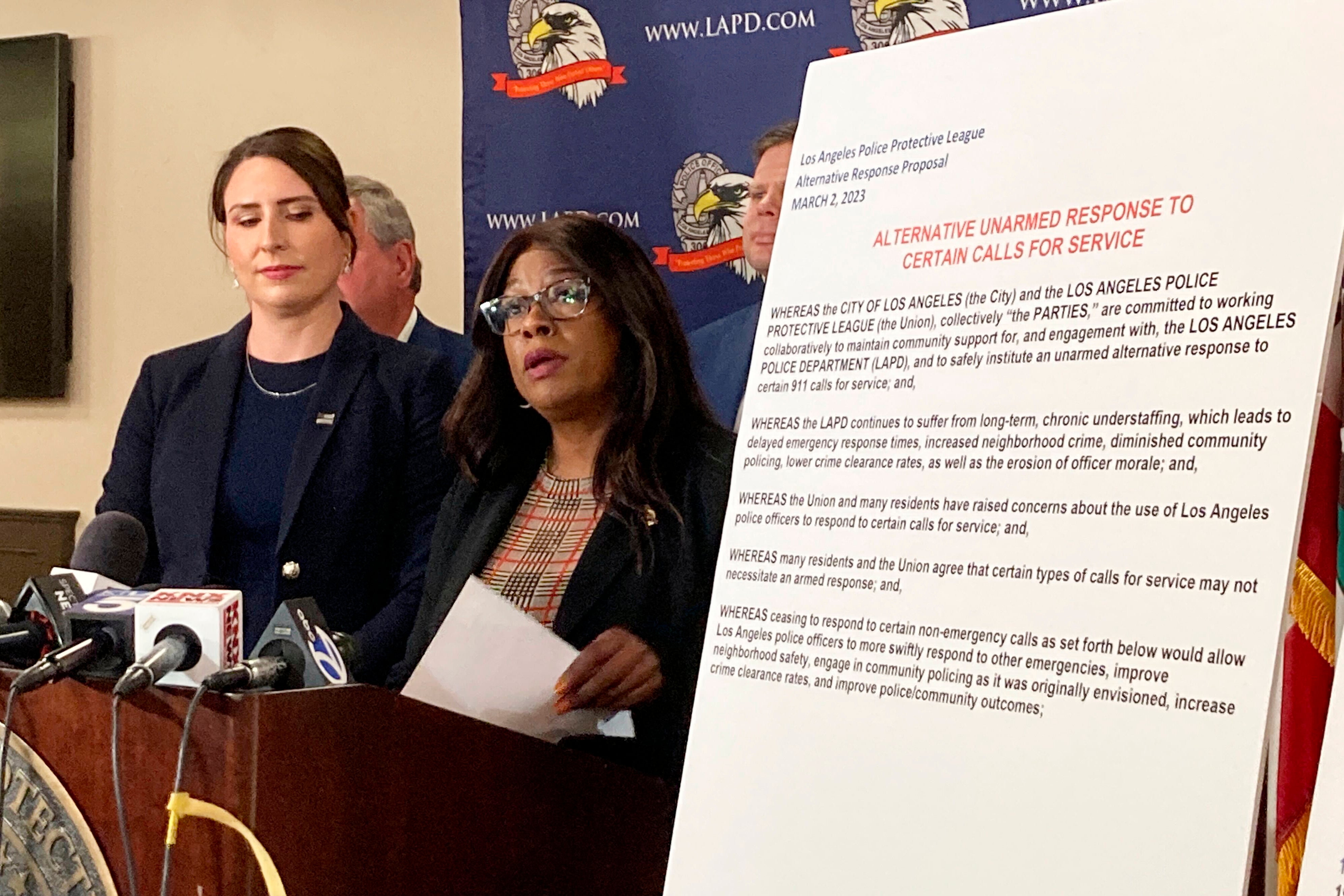Los Angeles police union proposes limits to 911 responses
The Los Angeles Police Department’s rank-and-file union is proposing that someone other than police respond to more than two dozen types of 911 calls in a bid to transfer their workload to more serious crimes

Your support helps us to tell the story
From reproductive rights to climate change to Big Tech, The Independent is on the ground when the story is developing. Whether it's investigating the financials of Elon Musk's pro-Trump PAC or producing our latest documentary, 'The A Word', which shines a light on the American women fighting for reproductive rights, we know how important it is to parse out the facts from the messaging.
At such a critical moment in US history, we need reporters on the ground. Your donation allows us to keep sending journalists to speak to both sides of the story.
The Independent is trusted by Americans across the entire political spectrum. And unlike many other quality news outlets, we choose not to lock Americans out of our reporting and analysis with paywalls. We believe quality journalism should be available to everyone, paid for by those who can afford it.
Your support makes all the difference.The Los Angeles Police Department’s rank-and-file union is proposing that someone other than police respond to more than two dozen types of 911 calls in a bid to transfer officers' workload to more serious crimes. The move is part of a national trend aimed at limiting situations where armed police officers are the first to respond.
The proposal announced Wednesday by the Los Angeles Police Protective League lists 28 kinds of 911 calls where other city agencies or nonprofit organizations would be sent first. The calls range from mental health situations, quality-of-life and homeless issues, problems at schools and welfare checks, to certain non-fatal traffic collisions, parking violations, trash dumping, loud parties, public intoxication and panhandling.
The league said officers would respond if the situation becomes violent or criminal in nature, but only after the initial call goes to another agency or an affiliated nonprofit.
“Police officers are not psychologists. We are not psychiatrists. We are not mental health experts. We are not social workers, doctors, nurses or waste management experts,” Debbie Thomas, one of the union’s directors, said Wednesday during a news conference. “I do believe that many people think we should be all those things but we are not. We should be focused on responding to emergencies, saving lives (and) property, and of course, engaging in community policing.”
Cities including San Francisco, San Diego and New York — as well as Los Angeles — have already implemented programs where clinicians are either paired with officers or work in civilian teams to respond to 911 calls involving someone who is having a mental health crisis.
The changes came amid a closer look at law enforcement in the U.S. in the wake of George Floyd’s killing by Minneapolis police in 2020. That included looking at how police handle mental health and other calls that don't include violence or criminality.
The Los Angeles proposal comes during the union’s contract negotiations with the city and amid activists’ pleas for reducing or eliminating armed responses to certain situations. The City Council and the mayor's office will be involved in the final decision about the proposal, the union said.
Activists have long called for Los Angeles police to stop responding to certain mental health calls, minor traffic collisions and encounters in homeless encampments, pointing to times when officers have fatally shot people during the response.
The LAPD and the mayor's office did not immediately have comments on Wednesday. Mayor Karen Bass promised during her campaign to create a public safety office that did not include the LAPD.
Hugh Esten, a spokesperson for City Council President Paul Krekorian, said the union's proposal will be given serious consideration as city officials work to “ensure that sworn personnel are deployed where they are truly needed and that unarmed responders address those situations where an armed response is unnecessary.”
With decreased staffing during the COVID-19 pandemic, the union said its proposal would free up officers to respond to more important calls — such as violent crime — and allow cops to engage in more community policing to build better relationships with the city's residents.
Other cities have also experimented with similar models, such as Portland, Oregon, where unarmed “public support specialists” take reports on things like vehicle break-ins and bike thefts.
In 2021, the LAPD launched a pilot program to divert some mental health calls to service providers. The department also started dual-response teams that pair officers with clinicians in situations involving mental health crises and people experiencing homelessness, as well as domestic violence and abuse.
Also in 2021, the LAPD stopped responding to minor traffic crashes; a deputy chief at the time said the change would eliminate officers responding to roughly 40,000 calls a year.